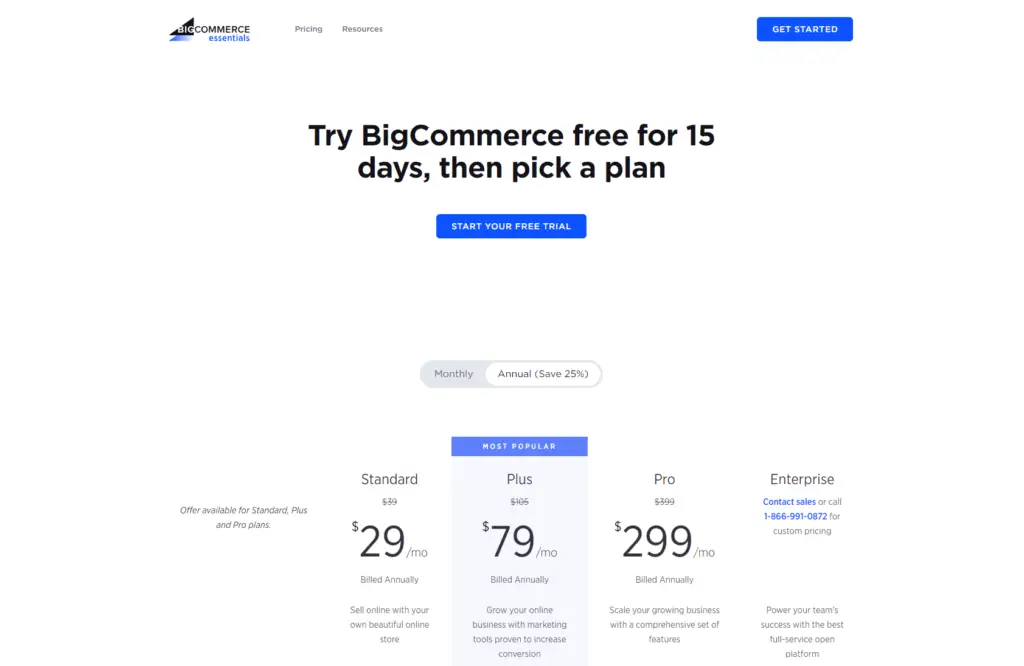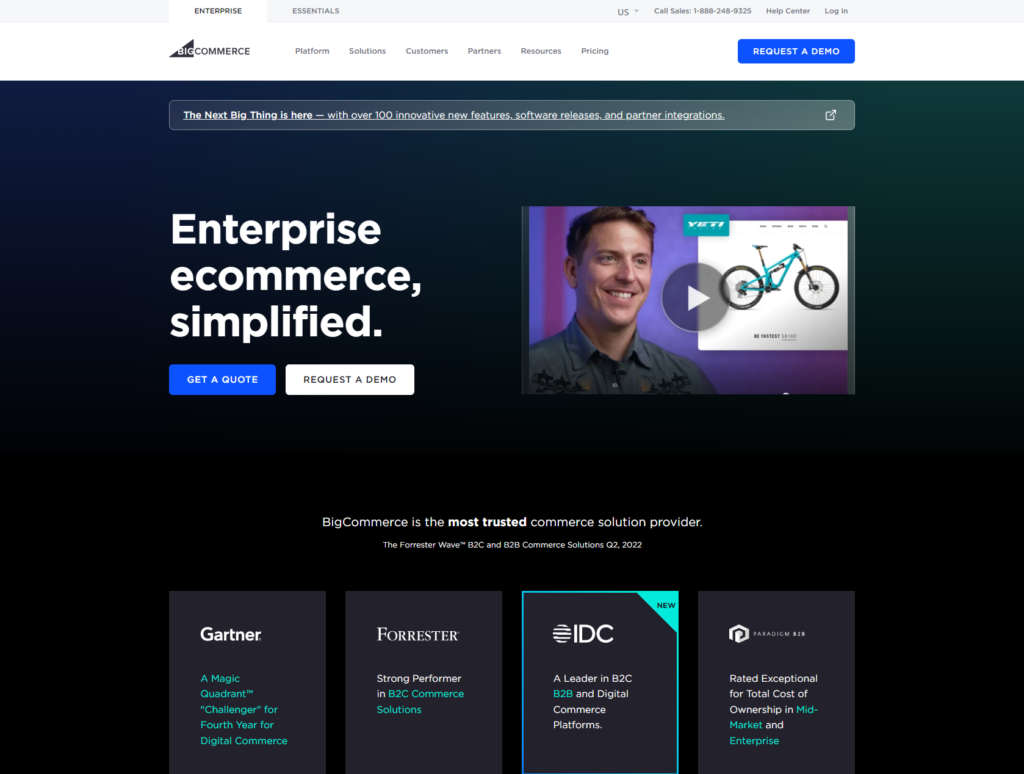BigCommerce is a leading eCommerce platform that provides businesses of all sizes with the tools they need to create and scale their online stores. Known for its robust feature set, user-friendly interface, and powerful integrations, BigCommerce has become a go-to solution for retailers looking to enhance their online presence and drive sales.
Selecting the right eCommerce can help streamline operations, improve customer experience, and support business growth. Conversely, a poor choice can lead to inefficiencies, lost sales, and frustration. Therefore, it’s essential to carefully evaluate options like BigCommerce to ensure they meet your business needs.
Overview of BigCommerce
BigCommerce was founded in 2009 by Eddie Machaalani and Mitchell Harper. Since its inception, the company has grown rapidly, establishing itself as a major player in the eCommerce industry. Headquartered in Austin, Texas, BigCommerce now serves thousands of merchants around the world, ranging from small businesses to large enterprises.
BigCommerce targets a diverse range of businesses, from startups to established enterprises. It positions itself as a scalable solution that can grow with businesses over time.
With its extensive feature set and flexible pricing plans, BigCommerce appeals to a wide audience, including those looking for an alternative to platforms like Shopify and WooCommerce.
BigCommerce Features:
Storefront Design
Customizable Themes: BigCommerce offers a wide variety of customizable themes that allow businesses to create visually appealing and unique online stores. These themes are designed to be user-friendly, enabling merchants to easily make changes to the layout, color schemes, and overall design without needing extensive coding knowledge. The platform also supports third-party themes, giving users even more flexibility to find a design that perfectly matches their brand identity.
Responsive Design for Mobile and Desktop: In today’s digital age, eCommerce stores need to be accessible on all devices. BigCommerce themes are fully responsive, ensuring that your store looks great and functions smoothly on both mobile and desktop devices. This responsiveness helps improve user experience, reduces bounce rates, and can boost your search engine rankings, as mobile-friendliness is a key factor in SEO.
Product Management
Bulk Product Import/Export: Managing a large inventory can be challenging, but BigCommerce simplifies this with its bulk product import/export feature. This tool allows merchants to quickly upload or download product information in bulk using CSV files, saving time and reducing the likelihood of errors.
Inventory Management: BigCommerce provides robust inventory management tools that help businesses keep track of their stock levels in real-time. Merchants can set up low-stock alerts, manage inventory across multiple channels, and even automate the restocking process, ensuring they never run out of their best-selling products.
Product Variants and Options: BigCommerce supports an extensive range of product variants and options, making it easy for merchants to offer their customers multiple choices for a single product. Whether it’s different sizes, colors, or materials, BigCommerce allows for detailed customization of product listings, enhancing the shopping experience.
SEO and Marketing Tools
Built-in SEO Features: BigCommerce comes with built-in SEO tools that help improve your store’s visibility on search engines. Users can easily edit meta titles, descriptions, and URLs for their products and pages. Additionally, BigCommerce supports automatic sitemaps and optimized URLs, which can help enhance your site’s SEO performance.
Marketing Integrations: BigCommerce integrates seamlessly with various marketing platforms, including email marketing services like MailChimp and social media platforms like Facebook and Instagram. These integrations allow merchants to create targeted marketing campaigns, track their performance, and engage with their customers more effectively.
Discount and Coupon Creation: Offering discounts and coupons can drive sales and attract new customers. BigCommerce makes it easy to create and manage discount codes and coupons. Merchants can set specific rules for each promotion, such as minimum purchase amounts or expiration dates, to ensure they align with their marketing strategies.
Payment and Checkout
Supported Payment Gateways: BigCommerce supports a wide range of payment gateways, including popular options like PayPal, Stripe, and Square. This flexibility allows merchants to choose the payment processors that best fit their business needs and customer preferences.
Checkout Customization: A smooth checkout process is crucial for reducing cart abandonment rates. BigCommerce offers customizable checkout options that allow merchants to tailor the checkout experience to their specific requirements. Features like one-page checkout, guest checkout, and custom fields help create a seamless and user-friendly experience for customers.
Multi-Currency Support: For businesses selling internationally, BigCommerce’s multi-currency support is a significant advantage. Merchants can display prices in different currencies based on the customer’s location, making it easier for global customers to shop on their site and increasing the likelihood of international sales.
Security and Performance
PCI Compliance: Security is a top priority for any eCommerce business, and BigCommerce ensures that all transactions are secure with PCI compliance. This compliance means that BigCommerce meets the Payment Card Industry Data Security Standards (PCI DSS), protecting both merchants and customers from fraud and data breaches.
Fast Loading Speeds: Website speed is critical for providing a good user experience and improving SEO rankings. BigCommerce is built for speed, with optimized servers and a content delivery network (CDN) that ensures fast loading times for your store, regardless of where your customers are located.
Regular Updates and Backups: BigCommerce takes care of regular updates and backups, ensuring that your store always runs smoothly and securely. This means that merchants can focus on running their business without worrying about technical maintenance.
Analytics and Reporting
Sales Reports: BigCommerce offers detailed sales reports that provide insights into your store’s performance. These reports include data on total sales, average order value, and sales by product or category, helping you make informed business decisions.
Customer Insights: Understanding your customers is key to improving their shopping experience and increasing sales. BigCommerce provides customer insights, such as purchase history and behavior patterns, allowing merchants to tailor their marketing strategies and product offerings to meet customer needs better.
Integration with Google Analytics: BigCommerce integrates seamlessly with Google Analytics for more advanced analytics. This integration allows merchants to track detailed website traffic, user behavior, and conversion rates, providing a comprehensive view of how customers interact with their store.
BigCommerce Pricing Plans:
BigCommerce offers a range of pricing plans designed to accommodate businesses of various sizes and needs. Each plan provides different levels of features and support, allowing merchants to choose the one that best fits their requirements and budget.

Standard Plan
Features Included
- Unlimited products, file storage, and bandwidth
- Single-page checkout
- Responsive website
- Professional reporting tools
- No transaction fees
- Up to $50k in online sales per year
Monthly Cost: The Standard Plan is priced at $29.95 per month, making it an affordable option for small businesses or startups looking to establish their online presence with a robust set of basic features.
Plus Plan
Additional Features Over the Standard Plan
- Customer groups and segmentation
- Abandoned cart saver
- Advanced product filtering
- Persistent cart
- Up to $180k in online sales per year
Monthly Cost: The Plus Plan costs $79.95 per month. It is designed for growing businesses that need more advanced features to manage customer relationships and recover lost sales through abandoned cart recovery and customer segmentation.
Pro Plan
Advanced Features for Larger Businesses
- Google customer reviews
- Custom SSL
- Product filtering (faceted search)
- Unlimited API calls
- Up to $400k in online sales per year (custom pricing available for higher sales volumes)
Monthly Cost: The Pro Plan is priced at $299.95 per month. This plan is ideal for larger businesses that require advanced features to enhance customer trust, streamline large inventories with product filtering, and utilize unlimited API calls for more complex integrations.
Enterprise Plan
Custom Features and Pricing: The Enterprise Plan offers custom pricing tailored to the specific needs of large enterprises. The plan includes all features from the Pro Plan, plus additional benefits such as:
- Dedicated account management
- Customizable price-lists
- Advanced security features
- Priority support
- API support and consultation
- Up to $1M+ in online sales per year
Benefits for Large Enterprises: The Enterprise Plan is designed for large businesses with high sales volumes and complex needs. It provides a high level of customization, priority support, and dedicated account management to ensure that the platform meets the business’s specific requirements. This plan offers scalability and flexibility, allowing enterprises to efficiently manage their extensive operations and maintain robust security and performance.
Pros and Cons of BigCommerce:
Pros
Comprehensive Feature Set: BigCommerce offers a wide range of features that cater to various aspects of running an online store, including product management, SEO and marketing tools, payment and checkout options, and robust analytics. This comprehensive feature set makes it a versatile platform capable of meeting the needs of different types of businesses.
Scalability for Growing Businesses: One of the standout advantages of BigCommerce is its scalability. Whether you’re a small startup or a large enterprise, BigCommerce can accommodate your growth. The platform supports unlimited products, file storage, and bandwidth, allowing businesses to expand their operations without worrying about outgrowing their eCommerce solution.
Strong Security Measures: BigCommerce takes security seriously, offering features like PCI compliance, SSL certificates, and regular updates and backups. These measures ensure that both your business and your customers’ data are protected against threats, providing peace of mind and fostering trust.
Cons
Pricing Can Be High for Small Businesses: While BigCommerce offers a robust set of features, pricing can be a barrier for small businesses and startups. The cost of the higher-tier plans may be prohibitive for businesses with limited budgets, especially when compared to other platforms with lower starting prices.
Limited Theme Customization for Non-Technical Users: Although BigCommerce offers customizable themes, the level of customization available to non-technical users can be limited. Advanced design customizations often require knowledge of HTML, CSS, and JavaScript, which may necessitate hiring a developer or investing time in learning these skills.
Comparison with Competitors:
BigCommerce vs. Shopify
BigCommerce
Strengths:
- No Transaction Fees: Unlike many other platforms, BigCommerce does not charge transaction fees, which can result in significant cost savings for merchants, especially those with high sales volumes.
- Built-in Features: BigCommerce offers a robust set of built-in features, including advanced SEO tools, product management, and marketing integrations, reducing the need for additional apps or plugins.
- Scalability: Designed to support businesses of all sizes, BigCommerce can easily scale with your business as it grows, offering the flexibility to handle increased traffic and sales.
Weaknesses:
- Higher Starting Price: BigCommerce’s starting price is higher than some competitors, which may be a barrier for small businesses or startups with limited budgets.
- More Limited App Store: Compared to Shopify, BigCommerce has a smaller app ecosystem, which may limit the availability of certain niche functionalities or third-party integrations.
Shopify
Strengths:
- Extensive App Ecosystem: Shopify boasts one of the largest app stores in the eCommerce space, offering thousands of apps to extend the platform’s functionality, from marketing and sales tools to inventory management and customer service.
- User-Friendly Interface: Known for its intuitive and easy-to-use interface, Shopify is ideal for users who are new to eCommerce or prefer a straightforward setup process.
- Strong Community Support: With a large and active user community, Shopify users can easily find support, tutorials, and forums to help them navigate any challenges.
Weaknesses:
- Transaction Fees: Unless using Shopify Payments, merchants are subject to transaction fees on each sale, which can add up over time.
- Additional Costs for Advanced Features: While Shopify’s core offering is robust, many advanced features require additional paid apps, which can increase the overall cost of using the platform.
Key Differences and Similarities:
- Similarities: Both platforms provide comprehensive eCommerce solutions with powerful features to manage an online store. They support a wide range of payment gateways, offer mobile-responsive themes, and provide marketing and SEO tools.
- Differences: BigCommerce’s no transaction fees and robust built-in features make it a cost-effective choice for high-volume sellers. Shopify’s extensive app store and user-friendly interface make it a versatile option for businesses seeking specific functionalities and ease of use.
BigCommerce vs. WooCommerce
BigCommerce
Strengths:
- Hosted Solution: As a fully hosted solution, BigCommerce handles all aspects of server maintenance, security, and updates, freeing merchants from technical management.
- Built-in Security: BigCommerce includes PCI compliance and SSL certificates as standard, ensuring a high level of security for transactions and customer data.
- Scalability: The platform is designed to support businesses as they grow, with features that cater to both small startups and large enterprises.
Weaknesses:
- Higher Cost: Compared to WooCommerce, BigCommerce’s plans can be more expensive, particularly for small businesses that need advanced features.
- Less Flexibility in Customization: Non-technical users may find BigCommerce’s customization options limited compared to the extensive flexibility offered by WooCommerce, which can be extended with numerous plugins and custom code.
WooCommerce
Strengths:
- Highly Customizable: WooCommerce is a WordPress plugin that offers immense customization through themes, plugins, and custom code, allowing businesses to create unique, tailored online stores.
- Free to Start: WooCommerce itself is free to use, though costs for hosting, premium plugins, and themes can add up. This makes it a cost-effective option for businesses that are comfortable managing their own hosting and site maintenance.
- Strong Community Support: With a large and active community of developers and users, WooCommerce offers extensive support, resources, and tutorials.
Weaknesses:
- Requires Technical Knowledge: Setting up and maintaining a WooCommerce store requires more technical expertise than a hosted solution like BigCommerce. This includes managing hosting, security, and updates.
- Additional Costs for Hosting and Extensions: While the plugin itself is free, businesses need to pay for web hosting, premium themes, and plugins, which can increase the overall cost.
Key Differences and Similarities:
- Similarities: Both BigCommerce and WooCommerce offer powerful eCommerce solutions with extensive features to support online businesses. They both support a wide range of payment gateways and offer tools for SEO and marketing.
- Differences: BigCommerce provides an all-in-one hosted solution with strong security and scalability, making it ideal for businesses looking for a hands-off approach to technical management. WooCommerce, on the other hand, offers greater customization and flexibility but requires more technical involvement and ongoing maintenance.

